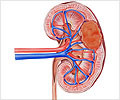It has emerged that of the 38,000 Americans diagnosed with renal cell carcinoma (RCC) each year, approximately 20 percent have non-clear cell forms of the disease.

"With clear-cell RCC, there is a lot of data," said Fox Chase Cancer Center medical oncologist Elizabeth R. Plimack, M.D., M.S., who led the study while at University of Texas MD Anderson Cancer Center and will report the results at the 46th Annual Meeting of the American Society of Clinical Oncology on Monday, June 7.
"Most large studies have involved primarily or exclusively clear-cell patients. Because data on the behavior of non-clear cell kidney cancer is lacking, the disease has been treated similarly to clear cell. Now that we're taking a hard look at how sunitinib works on non-clear cell kidney cancer, we're seeing a lot of differences between the two diseases," says Plimack.
Working with investigators at the University of Texas MD Anderson Cancer Center, Plimack and fellow researchers examined the response and survival rates of 23 patients with papillary RCC who were treated with sunitinib.
The study built upon prior research that showed a high response rate and improved progression-free survival and overall survival in patients with clear-cell RCC who used sunitinib to interfere with the growth of cancers cells, either slowing or stopping the development of tumors.
In the current study, patients with papillary RCC were treated with sunitinib according to a two-stage design. Following the sunitinib regimen, Plimack and her colleagues found no major responses, a median progression free survival of 1.6 months and median overall survival of 10.8 months. The best response was stable disease in eight patients. The results underscore the need to develop more effective therapies for papillary RCC.
Advertisement
Advertisement
RAS












